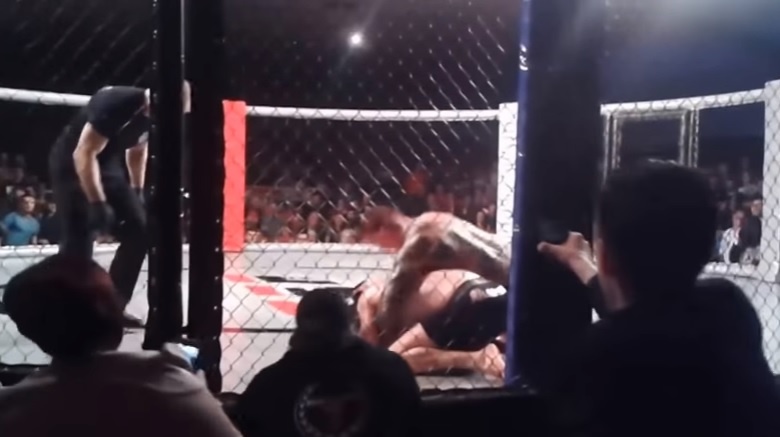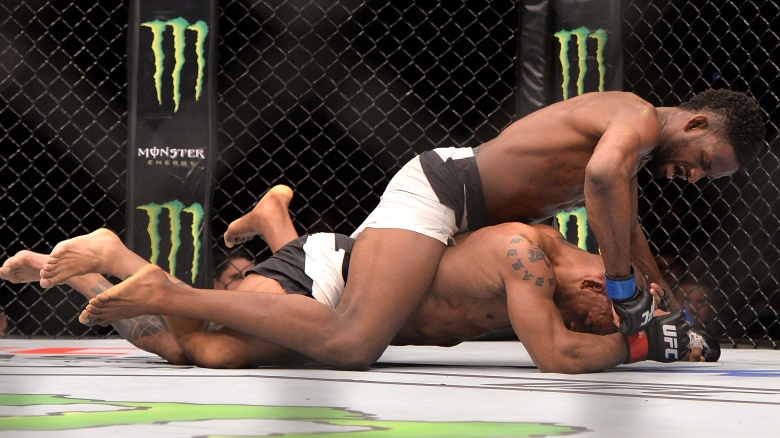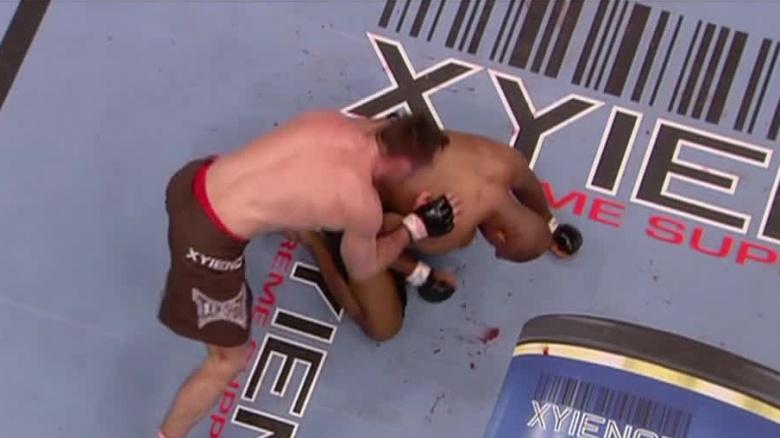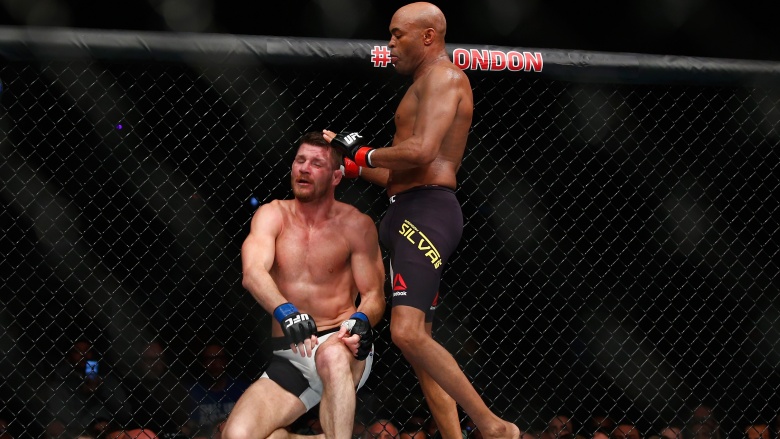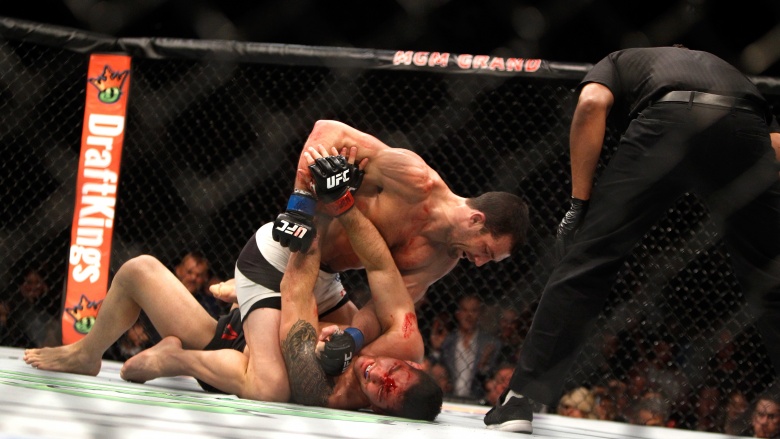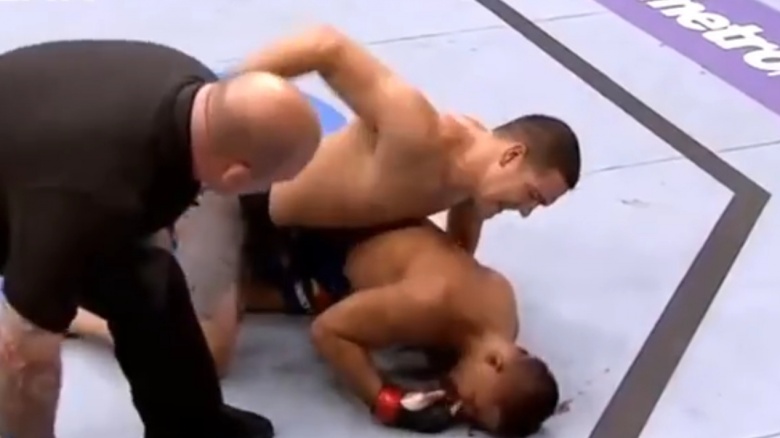MMA Fights That Should Have Been Stopped But Weren't
Professional mixed martial arts is a blood sport—a dangerous, visceral, physical confrontation that usually ends with one contestant triumphant, and both contestants broken and battered. Violence is the name of the game, and to be expected. Still, sometimes a match is so violent, or so lopsided, that the referees are forced to step in and stop the match. And usually they do. But not always. Here's a look at some MMA fights that should have been stopped, but either weren't, or were stopped far too late.
Charlie Ward vs. Joao Carvalho
On April 9, 28-year-old Portuguese fighter Joao Carvalho stepped into the cage against Charlie Ward. He wouldn't step out. After being pummeled unconscious, Carvalho was brought to the emergency room—he died two days later from massive head trauma, the fifth MMA fighter to die in the ring since 2007. Both Ward's father and buddy Conor McGregor, the top MMA pro in the world right now, put the blame on the ref for not stopping the fight earlier, as Ward delivered several punishing blows to Carvahlo's head after the fighter was clearly already unconscious. "It could have been stopped a little earlier," McGregor told MMA Connect TV. "I feel these referees need to be on the ball a little bit." Truer words have never been spoken.
Neil Magny vs. Hector Lombard
The failure of the ref to stop Joao Carvalho's death was especially egregious since, just weeks earlier, the sport had been forced to re-examine its refereeing procedures, following Magny/Lombard at UFC Brisbane. At the end of the second round, Magny delivered a savage, uninterrupted beating, which the exhausted Lombard could not defend himself from. Despite this, the ref allowed the match to proceed to a third round, where Magny continued to destroy Lombard before the ref finally, mercifully, stopped the fight.
Even the UFC itself thought the fight should have been stopped. Tom Wright, UFC Director of Operations for Canada, Australia, and New Zealand, said at a press conference that "it's the referee's job, is to make sure that a fight is stopped, that the athlete can protect himself or herself. I'm sitting not quite as close as the referee was, but I thought that fight should've been stopped and it should've been stopped a long time before."
Rich Franklin vs. David Loiseau
One of the key tenets of MMA is that you don't stop the fight as long as both participants are still actively defending themselves. That was the justification for allowing this one-sided beatdown to run its full three-round course at UFC 58 on March 4, 2006. How bad was it? Franklin landed a crushing 211 strikes to just 26 for Loiseau. In fact, the only damage Franklin took the entire fight was self-inflicted: he beat Loiseau so badly that he broke his own hand from punching the poor guy so many times. As a result, both ended up in the hospital, a totally unnecessary result given how obviously lopsided the matchup was.
Anderson Silva vs. Michael Bisping
It's been a tough year for refereeing—this is our third fight from 2016 that should have been stopped earlier than it was. In this case, referee Herb Dean has been criticized both coming and going, because he had two different opportunities to end the Silva/Bisping fight, but inexplicably let it continue both times. First, Bisping lost his mouthguard. Usually this results in a stoppage, but Dean determined that since they were in a "heated exchange," it wouldn't be fair to stop the match. Bisping thought otherwise, and while he was asking Dean for a stoppage, Silva smashed him in the face with a flying knee. Bisping dropped to the canvas and Silva began celebrating his win. One problem: Dean didn't end the fight, and while Silva was celebrating, Bisping scraped himself up and hung on until the bell, winning a very controversial decision on points.
This is one of the rare cases where both athletes complained about the ref's decision not to stop the fight. Bisping ended up with the win as a result, but also with a trip to the hospital and a face full of stitches.
Luke Rockhold vs. Chris Weidman
The Silva-Bisping fight wasn't the first time Herb Dean has been at the center of controversy. Just last year, UFC president Dana White called out Dean for his dangerous, reckless refereeing, after the unfortunate spectacle of Luke Rockhold vs. Chris Weidman at UFC 194. In the third round, Weidman missed on a roundhouse kick. Rockhold took advantage by jumping on top of Weidman and pummeling the helpless fighter in the face repeatedly. Weidman had no opportunity to defend himself, but Dean allowed the uncontested beating to continue until Weidman was a bloody, very likely-concussed pulp, thanks to numerous direct blows to his unprotected head.
After the fight, White responded to widespread fan outcry by saying that "when a guy is that hurt and out of it and has trouble getting up, it probably should have been stopped." So why wasn't it? And why is Dean still doing the exact same thing in fights today?
Chris Weidman vs. Mark Munoz
Rockhold/Weidman was just the latest example of Dana White expressing displeasure at his own referees' incompetence. In fact, it's not even the only fight to involve Weidman! But back in 2012, it was Weidman delivering the excessive punishment, rather than receiving it.
In the second round, Weidman's opponent, Mark Munoz, missed on a punch and opened himself up. Weidman immediately took advantage, with an elbow that sent Munoz helplessly sprawled on the canvas. The fight should have been stopped right then, but referee Josh Rosenthal allowed it to continue, resulting in Weidman administering numerous vicious blows to Munoz's undefended head. Rosenthal eventually stepped in and ended the fight, but not before serious—and totally unnecessary—physical harm had been done to Munoz, who bled profusely across the canvas. "It was a bad stoppage," White said in an interview after the fight. "I hate that. It drives me crazy. How you can be standing like this looking down at a guy getting hammered like that and not think the fight needs to be stopped."
Intriguing words from White, especially given how many times it's happened since, all under his watch.

